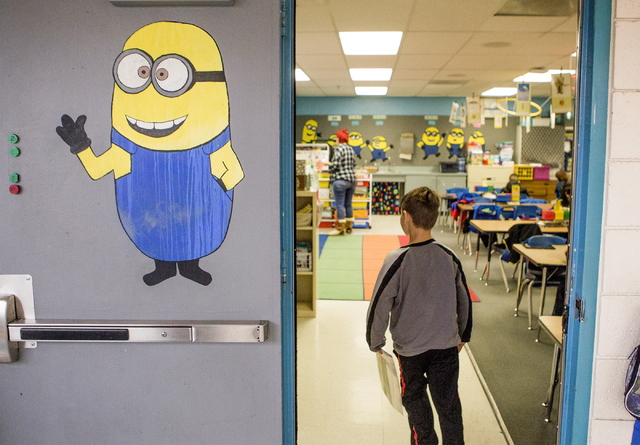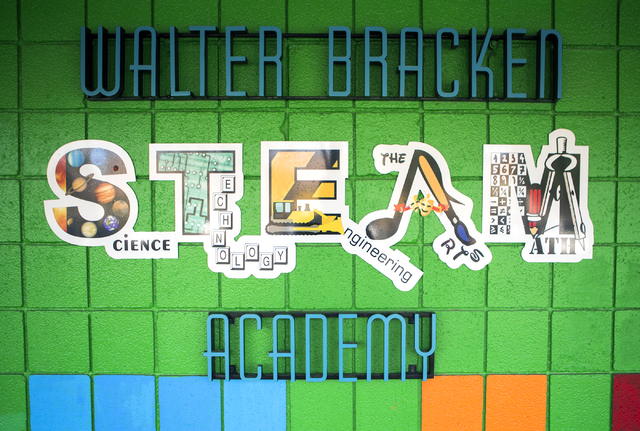Principal Katie Decker embodies possible model for CCSD reorganization
The person closest to the decision should be the one to make it.
That’s one of the basic philosophies Katie Decker, a principal of three empowerment schools in Clark County, operates under. As the district inches closer to the state-mandated reorganization in August, Decker’s three schools are a model of what could be replicated across the system.
“I’ve been pushing it for a long time because it works,” Decker said of the empowerment model, which gives principals, parents and school organizational teams power over how to run their budgets.
For the past 16 years, Decker, 50, has served as the principal at Walter Bracken STEAM Academy, a Title I magnet school focused on science, technology, engineering, arts and math. She became the principal at Long Elementary School about 18 months ago and added Hollingsworth Elementary School to her repertoire in April.
In an age where the focus is on testing and many schools across the nation have cut back on fun programs to focus on testing, Decker’s doing the opposite.
“When we find that recipe for success, we push hard for it,” Decker said.
Bracken has long been recognized by state and national officials as a high-performing elementary school, including being named a Blue Ribbon School.
On Thursday, the staff will celebrate being one of 54 schools nationwide designated as a Title I Distinguished School. Title I schools serve students living in poverty.
A CREATIVE CULTURE
Learning doesn’t have to be in the form of a lecture. Students can prepare for exams in a multitude of ways. Or, as Decker said: “Here’s your pot of money, how can you get results.”
Decker unleashed new programs in her schools, and they quickly began paying dividends.
A literacy program rewards students with charms to put on a necklace when they finish a series of books. To earn the charm, students must finish a multi-book series, taking a short quiz after each book. The series are in different classrooms, so students interact with other teachers to check out books.
Students also garden. Farmer’s markets in the spring run by students teach valuable lessons about operating a business.
Kids make music by banging on pots and pans hung on an exterior wall.
They save money by opening savings accounts at a miniature bank at the school. The bank, which presents the students with a check when they leave for middle school, includes monthly financial lessons on several topics, such as how credit cards work.
“When you systematize things, it becomes part of the culture,” she said.
The programs are an important part of the culture, but so is Decker’s leadership. Decker seamlessly jumps from spouting reading and math stats for different grade levels to hugging children and asking them about the books they read. More than once during a school visit Monday, Decker repeated part of her philosophy: If it works and get results, do it.
ROLE AS PRINCIPAL
The traditional view of the principal is one who gets marching orders from the district, communicates them to the staff and ensures they’re carried out under the district guidelines.
Decker has tried to flip that on its side, she said, by encouraging students, staff and families to brainstorm solutions, programs and curriculum.
It’s a significant shift, but one Decker said has worked.
“I know what we have is working,” Decker said. “We don’t allow complaints, we allow discussions about solutions.”
Decker also has turned to parents, community members and volunteers for help in reshaping the school.
Murals depicting different careers line the hallways. An area in the library is designated as the parent-volunteer center. Teachers drop off printing and copying requests, which are then completed by the volunteers, sparing teachers from the time-consuming task.
At Long and Hollingsworth, she also grouped classrooms so teachers and students in the same grades would be next to each other, something she called a simple move.
“When you take over two other schools, you see all the other details,” she said.
As the reorganization proceeds, Decker hopes it will force other principals to take more notice of what’s working in her schools.
“We just want our neighbors to come and copy our strategy,” she said.
DIVERSE POPULATIONS
About 33 percent of Bracken’s 550 students are English-language learners; 65 percent qualify for free and reduced lunches.
More than 300 of the students speak Spanish, and Decker estimated 20 or so more languages spoken at the school.
Decker works with the same base budget at other schools but also looks for donations and community time. The murals in the hallways were painted by volunteers looking for community service hours.
Despite those statistics, Decker said critics question her success because Bracken is a magnet school, meaning it draws neighborhood students and those who choose to enroll there for the special focus on science and technology.
That’s why Decker wanted to take on non-magnet schools when she expanded her principal role. A school’s success doesn’t hinge on having perfect students come into class, but instead on having teachers finding what works best for the students in front of them.
“It’s not the kids, it’s your expectations,” Decker said.
Contact Meghin Delaney at 702-383-0281 or mdelaney@reviewjournal.com. Follow @MeghinDelaney on Twitter.
RELATED
CCSD crafts legislative lobby strategy around reorganization needs
Tensions remain high between CCSD and state officials over charter school issue
Lawmakers avoid showdown over Clark County school system breakup plan
CCSD schools want to rise above Nevada's underperforming label


































